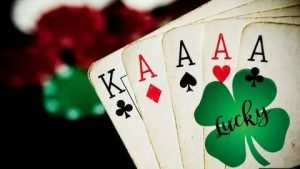Gambling is often a combination of both luck and skill, depending on the specific type of gambling activity involved. Here’s a breakdown:
- Games of Chance: Some forms of gambling, such as slot machines, roulette, or lottery games, are primarily based on luck. The outcome is determined by random chance, and players have little to no control over the results. In these cases, luck plays a significant role, and there is no skill or strategy that can consistently alter the outcome.
- Games of Skill: Other forms of gambling, such as poker, sports betting, or blackjack, involve an element of skill in addition to luck. While luck still plays a role in determining short-term outcomes, players can improve their chances of winning by employing strategies, making informed decisions, and utilizing their knowledge and skills. Skillful players can gain an edge over time and increase their long-term profitability.
- Combination of Luck and Skill: Many gambling activities fall somewhere between pure games of chance and games of skill. For example, games like craps or baccarat have elements of luck, but players can also make strategic decisions within the confines of the game’s rules. The outcome may still be influenced by luck, but skilled players can make choices that give them a better chance of winning.
It’s important to note that even in games where skill is a significant factor, luck can still play a role in short-term outcomes. Variance and unpredictability are inherent in gambling, which means that even the most skilled players can experience losses due to unlucky circumstances.
In summary, while luck is often a key component in gambling, the degree to which it influences the outcome depends on the specific game and the skills of the player. It’s crucial to approach gambling responsibly, understand the odds, and manage your expectations, whether you’re playing games of chance or games that involve skill.
Games of Chance
Games of chance in gambling are primarily based on luck. These are games where the outcome is determined by random chance, and players have little to no control over the results. Examples of games of chance include slot machines, roulette, lottery games, and certain types of dice games.
In these games, the outcome is determined by random number generators or physical elements like dice or spinning wheels. Luck plays a significant role in determining whether a player wins or loses, and there is no strategy or skill that can consistently influence the outcome.
While luck is a major factor in games of chance, it’s important to remember that the odds are typically designed in favor of the house or the gambling operator. This means that, in the long run, the house is more likely to profit from these games than the players.
It’s crucial to approach games of chance with the understanding that the outcome is largely unpredictable and that winning is not guaranteed. Responsible gambling involves setting limits, managing your bankroll, and understanding that luck can fluctuate, leading to both wins and losses.
Games of Skill
Skill games in gambling differ from games of chance in that they involve an element of skill or knowledge that can influence the outcome. While luck still plays a role, skill games provide an opportunity for players to improve their chances of winning through their abilities.
Examples of skill-based gambling games include poker, blackjack, sports betting (with proper analysis and research), and certain types of video poker or online casino games where player decisions can impact the outcome.
In these games, players can use strategies, knowledge of the game, and analytical skills to make informed decisions and increase their likelihood of winning. While luck can still affect individual outcomes, skilled players have the potential to achieve long-term success by consistently making better decisions and utilizing their expertise.
It’s important to note that even in skill-based games, luck can still play a role, especially in the short term. No matter how skilled a player is, they can still experience losses due to factors beyond their control, such as random card distributions or unexpected events in sports. Skill-based gambling requires a balance of skill, knowledge, and the acceptance of inherent uncertainties associated with luck.

Combination of Luck and Skill
Many forms of gambling involve a combination of luck and skill. The extent to which luck or skill influences the outcome can vary depending on the specific game or activity. Here are a few examples:
- Poker: Poker is a classic example of a game that combines https://mintmobile.co.za luck and skill. The initial hand dealt to players is based on luck, but the skill comes into play in terms of the decisions players make throughout the game, such as when to bet, fold, or bluff. Skilled players can consistently outperform less skilled players over the long run.
- Sports Betting: While the outcome of sports events is largely determined by the performance of the teams or athletes involved, skillful analysis and research can improve the chances of making accurate predictions. Successful sports bettors often rely on statistical analysis, historical data, and expert knowledge to inform their betting decisions.
- Blackjack: Blackjack is a card game where players compete against the dealer. The outcome is influenced by both luck (the cards dealt) and skill (the player’s decisions on when to hit, stand, double down, or split). Skilled players can use basic strategy and card counting techniques to minimize the house edge and increase their chances of winning.
It’s important to note that even in games that involve skill, luck still plays a role. Randomness and unpredictability are inherent to gambling, and no amount of skill can guarantee a win every time. The combination of luck and skill adds an element of excitement and uncertainty to gambling, making it both challenging and entertaining.
Poker
Poker is a prime example of a gambling game that combines elements of luck and skill. Here’s how luck and skill come into play in poker:
Luck:
- The initial distribution of cards is random, and players have no control over the cards they receive. The strength of your starting hand is primarily determined by luck.
- The order in which the community cards (such as the flop, turn, and river) are revealed can significantly impact the outcome of the game and is determined by luck.
- Sometimes, luck plays a role in the timing of the cards you receive. Getting a lucky card on the river can turn a losing hand into a winning one.
Skill:
- Poker is not just about the cards you have; it’s also about how you play them. Skilled players make strategic decisions based on their understanding of the game, their opponents’ tendencies, and the available information.
- Skills like reading opponents, bluffing, understanding probabilities, and calculating pot odds can give players an advantage.
- Successful poker players employ strategies to manage their bankroll, control emotions, and make disciplined decisions throughout the game.
While luck can influence the short-term results, skilled players can consistently win over the long run by making better decisions and capitalizing on their opponents’ mistakes. The interplay between luck and skill is what makes poker a fascinating and challenging game for both casual players and professionals.
Sports Betting
Sports betting is another form of gambling that combines luck and skill. Here’s how luck and skill are involved in sports betting:
Luck:
- The outcome of a sporting event is uncertain and influenced by various factors such as injuries, weather conditions, and referee decisions. These factors are beyond the bettor’s control and rely on luck.
- Unexpected occurrences or upsets can happen in sports, which can significantly impact the outcome of a bet.
Skill:
- Skillful bettors analyze and assess information such as team/player statistics, form, injuries, head-to-head records, and other relevant factors to make informed betting decisions.
- They use their knowledge of the sport, understanding of betting markets, and research to identify value bets and favorable odds.
- Successful sports bettors employ strategies like bankroll management, studying betting trends, and understanding betting strategies such as handicapping or arbitrage.
While luck plays a role in the short-term outcomes of sports betting, skillful bettors can gain an edge by making informed decisions based on their analysis and understanding of the sport. By consistently identifying value and making smart bets, skilled bettors can increase their chances of long-term profitability.
Blackjack
Blackjack is a classic casino game that combines both luck and skill. Here’s how luck and skill are involved in playing blackjack:
Luck:
- The initial distribution of cards is based on luck. Players have no control over the cards they receive or the cards dealt to the dealer.
- The order of cards in the deck is random, and the outcome of each hand depends on the cards drawn.
Skill:
- Skilled players use strategies to make optimal decisions based on their hand and the dealer’s upcard.
- Players can employ basic strategy, which is a mathematically derived set of rules that guide their actions in different situations.
- Advanced players may use card counting techniques to gain an advantage by keeping track of the relative proportion of high and low-value cards remaining in the deck.
While luck determines the initial cards dealt, skillful players can improve their odds of winning by employing effective strategies and making informed decisions throughout the game. By using the appropriate strategy based on the cards in play, players can reduce the house edge and increase their chances of winning in the long run.
